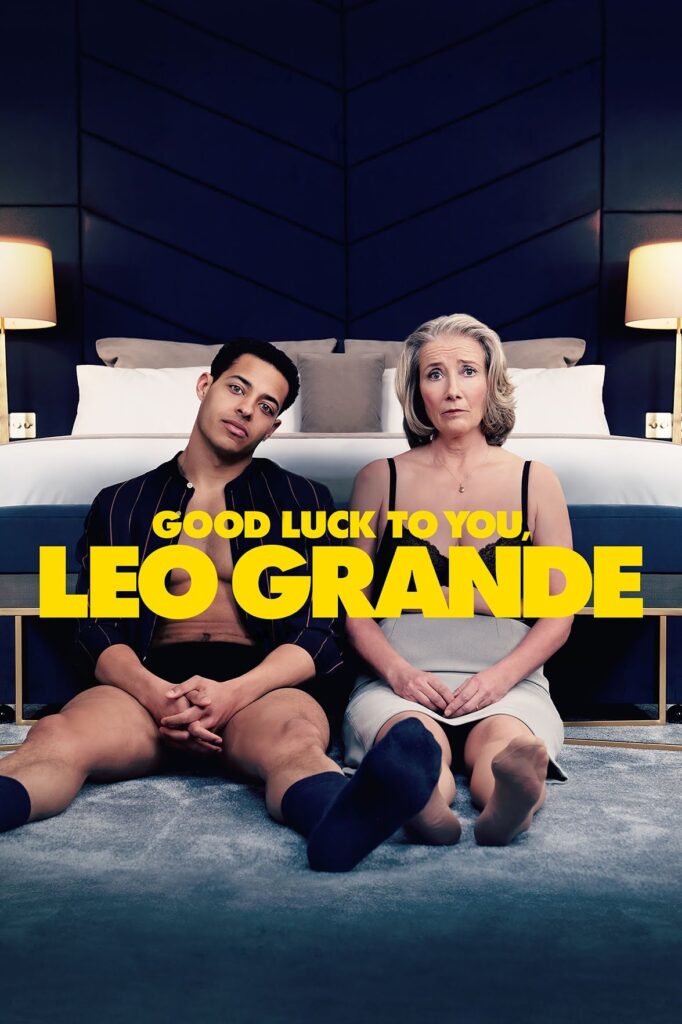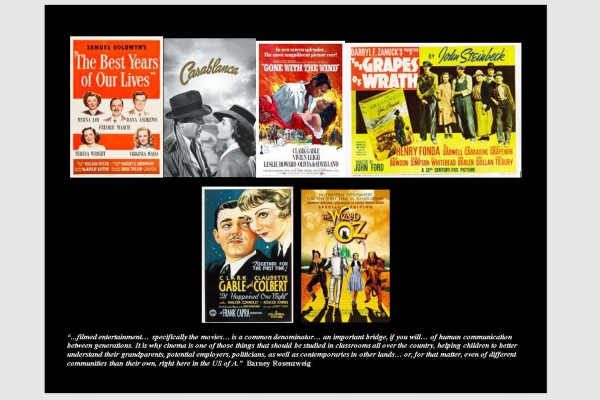I found myself, at lunch, mid-conversation with my banker, referencing Paddy Chayefsky’s Network to a blank stare. I pressed on, trying to answer fully the question of how I got started in the film and television business, setting the unlikely scene of anyone going into that business in the 1950s. “It was the era of ‘The Last Picture Show,’” I began. Again, there was no recognition.
It reminded me of my oft-stated thesis that filmed entertainment… specifically the movies… is a common denominator… an important bridge, if you will… of human communication between generations. It is why cinema is one of those things that should be studied in classrooms all over the country, helping children to better understand their grandparents, potential employers, politicians, as well as contemporaries in other lands… or, for that matter, even of different communities than their own, right here in the US of A.
There is an esthetic, largely invented in Hollywood by white men (they were almost exclusively men and most assuredly not representative of any minority) who were neither educated enough, nor were they qualified enough, to create these documents of social construct. Yet, create them they did… and more.
We may not have ever traveled to India, but we all have a very good idea what the Taj Mahal looks like… and the chances are that it is not because of a book on geography. More likely that “understanding” came from a visit to a darkened room with a flickering light coming from behind, projecting an image across the void onto a silver screen.
Film factories in Hollywood “taught us” what little girls are like, what little boys are like, and how they should dress… and talk… and act. They taught us civics, and patriotism, how to smoke, how to make love, what to do in a burning building, or how to acquit oneself when your plane is going down for a crash landing.
And what they taught us, tended to form us, gave us more than indicators as to how we should vote and how we should behave. The movies… or their derivatives… still sorta do that. But it is not nearly as universal a phenomenon as it once was… and only a precious few of these new films pay any kind of homage to their predecessors, to the beginnings of the culture, to the creation of the very language of cinema.
When you are at my stage of life you notice these things in conversations with people who are the age of my children (and younger… by a lot). Grownups who respond with a blank stare when a reference is made that is only appreciated by the very oldest in the room. It’s a good reason for those of you who were born anytime in the latter part of the 20th century or later, to stay-tuned to the Turner Classic Movie channel, or to pick up the list of the 100 essential movies from the American Film Institute.
Who knows? One day you may actually have to talk to an old guy like me. Or, if you wait just a little longer, maybe not.
In the meantime, here are some of the derivatives I have been watching.
SECRET CITY: It is the Australian version of America’s House of Cards. It is on Netflix, it stars the very interesting Anna Torv, who I first got a crush on in J.J. Abrams’ fabulous FOX TV series, Fringe. The sparsity of the preceding sentences comes under the general heading of the admonition “if you cannot say something nice, say little (or nothing) at all.” The series is two seasons of six episodes each. God help me, I watched all 12 of the hours.
OUR FLAG MEANS DEATH: This is a Gilbert & Sullivan operetta without Arthur Sullivan’s music or W.S. Gilbert’s fabulous lyrics. That about covers it, save for the production values on this overly silly series with very good actors. They (the sets, the costumes, the overall production design) are terrific… and, in my opinion, wasted on this series. My daughter, Erika Handman, who happens to be married to an Emmy Award Winner, recommended I watch this show. I want to be on record as forgiving her. Debra Goodstone insisted I “MUST state that Academy Award/GRAMMY/BAFTA winning, and Emmy nominated Taika Waititi” (who wrote/directed/acted in the film JoJo Rabbit) plays Blackbeard in this series and is part of the writing, directing, and producing team on this HBO offering. My thought was to spare Mr. Waititi (nee: Cohen) the embarrassment.
BLACK BIRD: A conventional mini-series presentation of an authentic undercover police operation inside our federal prison system. Prison never looked more sanitary, nor has a serial rapist’s story been told more delicately. Apple TV has it. As far as I am concerned, they can keep it.
GENTLEMAN JACK: The HBO series is in season two. If you like historical dramas with good costuming, wonderful character actors, and homoerotic sexual scenes, this may be your go-to series. Sally Wainwright, who was also the brains behind such solid Brit series as Happy Valley, Last Tango in Halifax, and the Cagney & Lacey rip-off, Scott & Bailey, here liberally lifts the award-winning Fleabag signature of having the lead actress break the fourth wall to directly communicate with the audience. It worked then and it works now… so, too, does Ms. Wainwright’s ability to continue to steal from the best.
GOOD LUCK TO YOU, LEO GRANDE: At the very least a nomination for best performance by an actress for Emma Thompson who gives, not only her usual very best… but virtually her entire body… to this semi-sexy two-hander dealing with a woman’s decision to hire a male sex worker, hoping (she says) to discover just what it is she may have been missing throughout her self-described, mundane life. She sorta does too. And good for her, I say. Mostly it is good for Ms. Thompson and her career… and that is not a bad thing. Hulu has it.

None of the above intrigues? Small wonder. Assuming that is the case, here is the beginning of what will become a much longer list of must-see films, memorialized here as I think of them. I will not include The Godfather or Citizen Kane since I am going to presume you look at these two (three if you count both parts I and II of The Godfather… and you should) at least every other year. No need to write to remind me that most of this work reinforces racial stereotypes or establishment mythology. In many ways these films not only entertain but “explain” how we got the way we are.
The Best Years of Our Lives, Casablanca, Gone With The Wind, The Wizard of Oz, The Grapes of Wrath, It Happened One Night.
If simply exposing yourself to these films does not make you a more interesting individual there may be little hope for you. Of course, there is always the route taken by Emma Thompson’s character in Good Luck to You, Leo Grande.
Follow Barney at:
https://www.facebook.com/CagneyAndLacey
To purchase “Cagney & Lacey and Me” click or go to:
http://www.cagneyandlacey.com/products-1/merchandise


